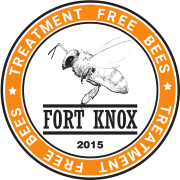Fort Knox – who we are
The world of the XXI century is full of dangers for the insects. There are less wild flowers every decade, the climate changes, air, soil and water are polluted by industry and agriculture. For allmost four decades in Poland the biggest threat for Honey bees (Apis mellifera) in apiaries has still been the mite: Varroa destructor. It is the number one problem of beekeeping and directly or indirectly it has been responsible for the most percentage of the bee colonies' losses. Permanent usage of chemical substances against the mites made the problems of bees grow on many levels. It made bees weaker, unadapted, and it made the pathogens more viral. Many dieseases that once were not the real issue for the bees, now cause the death of bee colonies.
This is our: people's and beekeepers' responsibility and we are to blame for this. We broguht those problems on bees. And the history of last decades shows that we cannot solve those problems using the previous methods. At least not, if we want the bees to be self sufficient. We have to let bees solve those problems on their own.
We are amateur beekeepers who believe, that the Nature can cope with most of the problems by Herself, if we let Her. We see that we as beekeepers must allow Nature work in our apiaries and in specific hives. We do not want to use any toxic or biocidal substances in our beeyards to “solve” the problems of bees, because we rather believe that in the first place they are the cause of majority of those problems that bees have today or at least the extent of them. The use of toxins and biocidal substances in apiaries leads only to moving the problems to the future and leaves them unsolved for the next generations of beekeepers. Chemical substances pollute and barren the bees' environment and they also interfere and disturb in any natural processes that occur in the hive, while making the pathogens grow stronger and more viral on the way. In the long run all that diminish the abilities of bees to cope with their problems, and leave them at grace of “protection” of beekeepers. With every decade, bees have harder to survive without treatments and interventions. We found ourselves in the vicious circle of modern beekeeping. If we uphold the current practice we will cause the problems to grow, if we stop using chemical substances, our bees will die...
To answer those mentioned problems we have founded our project “Fort Knox” and started to cooperate in selection of local bees adapted to their environment and resistant to pathogens and pests.
We believe that only by refraining from using chemical treatments in apiaries, and letting natural selection choose the adapted organisms, our bees may work out their own mechanisms and solutions that will allow them to cope with Varroa destructor and other pests. But the process is difficult and coslty. Not many beekeepers may walk through it alone.
We are beekeepers who think that cooperation will lead us further than if each of us worked alone. The effect of our combined effort is by far greater than the sum of individual efforts. Together we work for each other, we divide the risks, and share the joy of living bees.
We are beekeepers who have very different apiaries. There are some who have only two or three hives in the backyard, and there are some who have few dozens of hives and their beekeeper's ambition tells them to develop the apiary more and more. We have different hive types and we use different solutions in our apiaries. Some use heavy horizontal higly insulated hives, and some do not want any other than modern beekeeping equipment, such us thin walled wooden hives with screened bottoms and foil as an inner-cover. But we all belive in beekeeping wihout chemical substances now and in the future and we all belive in cooperation for the greater good. We think natural selection will solve most of the bees' problems if we let it, and will allow us to keep bees in the way we always wanted.
Today we have not gone beyond little amateurish project. There is only about a dozen of us working together. For now we are from two different circles of beekeepers that think in a bee-friendly ways of keeping bees: Natural Beekeeping Association “Free Bees” (http://wolnepszczoly.org/about-us/) and the Group “Bee Brotherhood” (http://bractwopszczele.pl/eng/eng.html). Hopefully Project “Fort Knox” will have larger range in the future and will join more beekeepers' groups and individual people who would want to contribute to a long term selection of resistant bees and skip all chemical treatments in their apiaries.
We invite You to get to know our Project and to join the cooperation. We can do more by working together!
